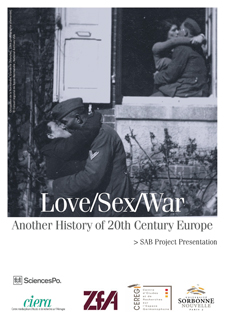 CFP: Love, Sex, and War: Towards another History of 20th Century Europe. Workshop One: Sources for Historians of Love, Sex, and War – Paris 05/15
CFP: Love, Sex, and War: Towards another History of 20th Century Europe. Workshop One: Sources for Historians of Love, Sex, and War – Paris 05/15
Patrick Farges (Université Sorbonne Nouvelle, CEREG); Elissa Mailänder
(Centre d’Histoire de Sciences Po); Stefanie Schüler-Springorum (Zentrum
für Antisemitismusforschung, TU-Berlin)
18.05.2015-19.05.2015, Paris, Centre d’Histoire de Sciences Po, Sciences
Po Paris
Deadline: 30.11.2014
This workshop will launch a two-year research project focusing on the
history of love, sex, and war in Europe. Historian Dagmar Herzog has
called the 20th century “the century of sex,” while Laura Lee Downs and
Kathleen Canning consider it a time when “gender troubles” emerged. Yet,
the 20th century also initiated greater equality between the sexes and
increasing liberalization of sexual norms and rights. Both categories –
gender and sexuality – profoundly shaped the last century. Two world
wars, genocide, and other episodes of mass violence make it crucial to
examine European societies from a social and cultural perspective and to
ask: what role did gender and sexuality play in these events?
War affects many aspects in the everyday lives of civilians and
combatants. Moreover, it irrevocably alters life after the hostilities
end. Recently, scholars (e.g. Andrew Bergerson, Jennifer Evans, and
Christa Hämmerle) have placed particular attention to the sources
available to examine the history of love, sex, and war. By examining key
issues of extant sources, our first workshop will begin to peel back the
layers of time that re-shaped scholars’ conceptions of love and
sexuality in times of war.
The workshop aims to identify specific sources that explore emotional
realms such as affection, desire, inhibitions, repulsion, and grief.
Indeed, writing a history of sexuality and emotions might require the
scholars in general, and, the workshop participants in particular, to
interrogate other forms of evidence and employ specific methods of
analysis. Outmoded sources can open paths to answer new questions. New
sources can be mobilized and created, as is the case with oral
histories. Individual accounts, including autobiographies and witness
testimonies, are important because they provide insight into a private
sphere that, especially in wartime, is inherently political.
Although sources may include tangible traces of sexual practices and
emotional responses only sporadically, they nevertheless embed the
narrated acts into a larger socio-historical framework. This first
workshop is will focus on exploring the range and interpretive
possibilities of sources, including oral histories, ego-documents,
institutional records, and (audio) visual sources.
How do these sources expand our understanding of love, sex, and war?
What can they tell us about the emotions and social practices? What
theoretical implications and methodological challenges arise for
historians engaging with those sources?
Application: Please send your abstract (max. 500 words) and a short
biography (max. 1 page) to elissa.mailander@sciencespo.fr and
patrick.farges@univ-paris3.fr before 30 November 2014.
We encourage PhD candidates and early career post-docs to apply for the
workshop.
War affects many aspects in the everyday lives of civilians and
combatants. Moreover, it irrevocably alters life after the hostilities
end. Recently, scholars (e.g. Andrew Bergerson, Jennifer Evans, and
Christa Hämmerle) have placed particular attention to the sources
available to examine the history of love, sex, and war. By examining key
issues of extant sources, our first workshop will begin to peel back the
layers of time that re-shaped scholars’ conceptions of love and
sexuality in times of war.
<http://chsp.sciences-po.fr/
